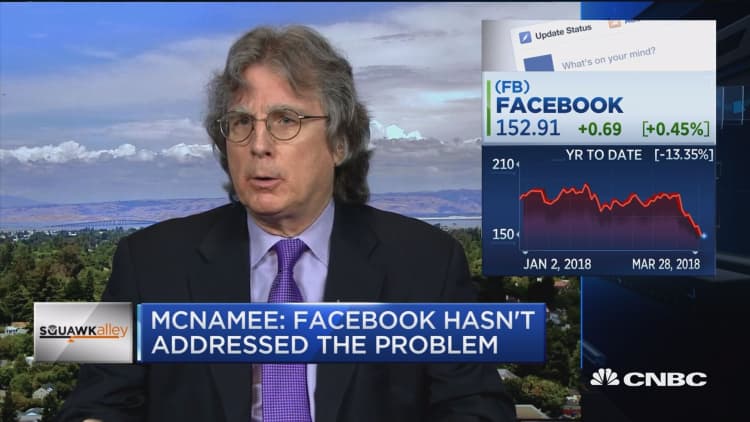
Facebook will need to change its business model in order to win back user trust, said Roger McNamee, one of Facebook's earliest advisors and a longtime tech investor.
"If you want to restore trust, you have to accept that some of your past business practices are deeply harmful to people," McNamee, managing director at Elevation Partners, a private investment firm focusing on new media and technology, told CNBC.
"And you have to change them, even if there's a cost to short-term earnings. Because, I think, in the long run, the brand is much more valuable to the extra penny of earnings that would come from maintaining the old business practice," he said on "Squawk Alley" Wednesday.
The solution may involve changing the fundamental business model, he said.
"In the advertising business, you basically get all the data you can get about your users and then you monetize it anyway you can," McNamee said. "Now we're having a day of reckoning. Where people used to say, that's okay. Now we're not so sure it's okay."
The hashtag #DeleteFacebook online began circulating shortly after the news broke of the scandal that affected approximately 50 million users. But McNamee doesn't think people will abandon the platform so fast. He is more concerned with the brand's image.
"The way that Zuckerberg and [Sheryl] Sandberg have handled this is almost the worst possible way if you're trying to protect your stock value," he said. "Trying to hide the ball. Trying to deflect criticism is not going to work anymore. This is a much bigger problem. They need to get on top of it and they need to do a way better job than they're doing so far."
He pointed out that between 2010 and 2014 several companies — not just Cambridge Analytica — were allowed to "harvest" user data without consent from Facebook users.
"That scares me as an investor," he said. McNamee said he did sell some of the company's stock after The New York Times and The Observer stories were released earlier this month, and has since turned over his Facebook position to a third party manager.
McNamee, a Silicon Valley veteran, has been an outspoken advocate for limiting social media use, saying it creates "incentives to addict people." He is also the founding advisor for the Center for Humane Technology.
On Tuesday, Facebook unveiled changes to its privacy settings, including a single page privacy tool. Previously, privacy tools were spread across 20 different screens.
Meanwhile, since the Cambridge Analytica story on March 17 up until Tuesday, stocks in Facebook have fallen 17 percent. Year to date the company is down 13 percent. On Monday, the Federal Trade Commission said it was investigating Facebook's data practices. Chief Executive Officer Mark Zuckerberg has also agreed to testify before Congress.


